We flew into a storm but the Israeli pilots lived up to their awesome reputation and landed smoothly in Tel Aviv airport to applause from passengers.
We were traveling to visit The Trendlines Group, the second Israeli company to list on the Singapore Exchange after Sarin Technologies.
For the past few weeks, Trendlines has been caught in a storm of a different kind --- a bear market that has, for no reason related to a change in its business fundamentals, pressured its stock price down badly.
From the IPO price of 33 cents in Nov 2015, the stock has sunk to as low as 14 cents.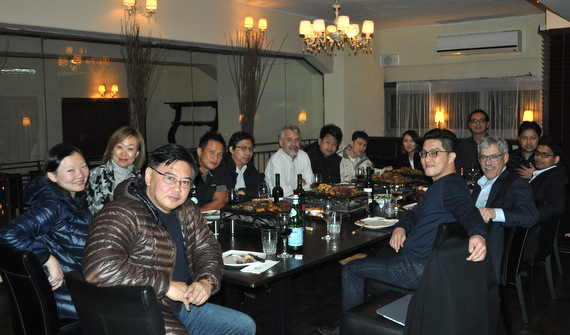
But over the four days that we spent attending presentations by various start-ups that are being incubated by Trendlines and speaking with Trendlines management, we became more familiar with the intrinsic value of the business of Trendlines.
It's unique as far as SGX-listcos go.
From Birth to Success at High Speed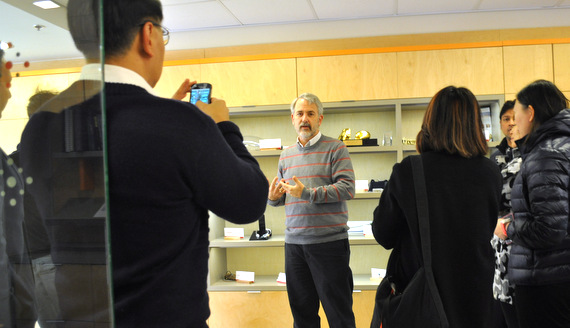 Co-Chairman and Co-CEO Steve Rhodes taking us around the various offices of medical start-ups housed under one roof by Trendlines in the Galilee. In the background is a display of gadgets developed by some of the start-ups. Co-Chairman and Co-CEO Steve Rhodes taking us around the various offices of medical start-ups housed under one roof by Trendlines in the Galilee. In the background is a display of gadgets developed by some of the start-ups. Photo by Leong Chan Teik Trendlines is one of 18 licensed incubators which the Israeli government hands out grants to their qualifying start-ups. Focusing on the medical and agricultural industries in order to "improve the human condition," Trendlines was founded in 2007 by Todd Dollinger and Steve Rhodes, both of whom have had diverse careers, including business development consultancy for start-ups in Israel. 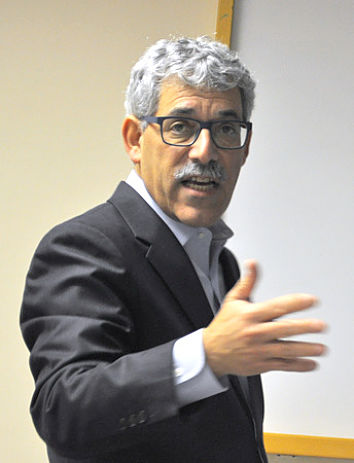 Trendlines Group Co-Chairman and Co-CEO Todd Dollinger: An articulate and humourous speaker. Photo by Leong Chan TeikAt Trendlines, both are Co-Chairman and Co-CEO -- obviously an unusual arrangement but they exhibit positive chemistry with each other. Trendlines Group Co-Chairman and Co-CEO Todd Dollinger: An articulate and humourous speaker. Photo by Leong Chan TeikAt Trendlines, both are Co-Chairman and Co-CEO -- obviously an unusual arrangement but they exhibit positive chemistry with each other. From evaluating about 500 possibilities a year, and doing due diligence on a shortlist, currently Trendlines is incubating 48 start-ups. They have qualified for cash grants from the Israeli government of, typically, about US$543,000 for agri-tech start-ups, and US$652,000 each for medical start-ups. Trendlines, for its part, injects about US$96,000 and US$115,000 cash, respectively, into the start-ups. It also houses the medical start-ups under one roof and the agtech start-ups in another part of Israel, providing all the support it can to them to enable them to focus on developing their technologies.
Trendlines estimates that its support services -- ie, administrative, office cost, accounting, etc --- are worth about US$450,000 over two years. There's help given also in areas such as market research, investor relations, connections to experts, and IP strengthening. The start-ups -- typically 50-50 owned by the entrepreneur and Trendlines -- are ready for the first round of funding in Year 2 and Trendlines will be on the way to an exit anytime after that. In the past eight years since Trendlines started business, it has achieved six exits, written off 16 start-ups out of a total of 62 start-ups. To investors of Trendlines, a key catalyst for the stock price would be exits and the resulting dividend payouts. Exits will pick up pace given that within Trendlines' expanding portfolio of companies, more start-ups will reach higher levels of business development. Currently, 17 of the start-ups are generating revenue -- which raises the odds of them being acquired by third parties. Trendlines, in fact, has announced that three of them (including Tel Aviv-listed ET View) have signed engagement letters with investment banks for possible M&A actions. Exits may be the end-game for Trendlines (which would then be holding 25-30% stakes after some dilution from investors) but, according to Trendlines' CEOs, prior to those events, and just as important, is the incubator's ability (and the start-ups' ability) to attract follow-on capital from investors, in order to develop further the business. "An increase in the value of the portfolio companies is certainly a very important metric. It is the key metric to understanding our work. That's No.1 and it typically comes from raising money for our companies and then from our exits," says Mr Dollinger. |
The Trendlines Group: Exit transactions
| Year of exit | Company | Age at time of sale | Estimated return * |
| 2011 | PolyTouch | 3 years old | 6.7X |
| 2013 | Innolap Surgical | 8 months old | 3.2X |
| 2013 | FlowSense | 4 years old | 4.0X |
| 2014 | Inspiro | 4 years old | 8.8X |
| 2014 | Unidentified | 5 years old | 66.9X |
| *Estimated return is a multiple on the exit proceeds to Trendlines’ investment which comprises (i) initial cash investment; (ii) value of the provision of services; and/or (iii) estimated overhead expenses | |||
How to value Trendlines?
Trendlines has shown that it has increased the value of its portfolio companies through the years. It said the fair market value of its current "10 most valuable portfolio companies" amounted to US$59.5 million as at June 2015.
One can see that from virtually nothing several years ago, these 10 companies now have an average value of US$6 million. That's value creation.
The total portfolio value of Trendlines' 48 portfolio companies was US$84.7 million as at mid-2015.
Using those figures as a reference, at a recent share price of 15 cents, the market is grossly undervaluing Trendlines, assigning it a market cap of just S$76 million. (And of that, about S$19 million is cash from the net proceeds of the IPO). 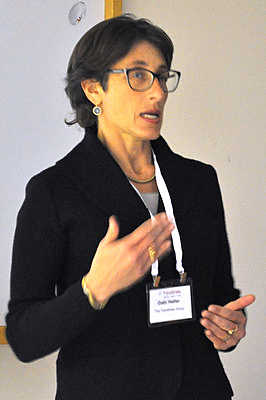
Photo by Leong Chan TeikOn a price-to-NTA metric, Trendlines trades currently at just 0.64.
This is far lower than the recent average price-to-fair market value ratio (as at end-2015) of about 2X for four similar incubators (Allied Minds, Imperial Innovations, IP Group and PureTech Health) listed on the London Stock Exchange.
"Why? The market there understands that the fair market values are significantly lower than the exit values, and what they are investing for is the exit values," notes CEO Steve Rhodes.
That said, the matter everyone wants to know is, how are the portfolio companies valued?
Every quarter, Trendlines uses a variety of valuation methodologies to value its start-ups, especially making reference to any fresh capital that a start-up had recently attracted.
Annually, the companies are evaluated by an external independent valuer, says CFO Gabi Heller. And then the valuations are studied by Trendlines' external auditor Ernst & Young.
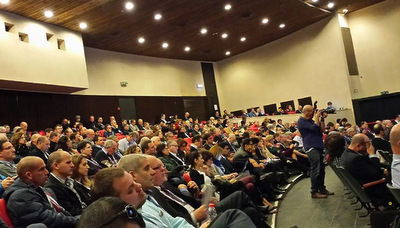 Photo: Trendlines In 2 articles next week, we will highlight the technologies of selected start-ups, as we heard them at the 6th annual Trendlines company showcase (left) and during our visit to the start-ups. Photo: Trendlines In 2 articles next week, we will highlight the technologies of selected start-ups, as we heard them at the 6th annual Trendlines company showcase (left) and during our visit to the start-ups. |







